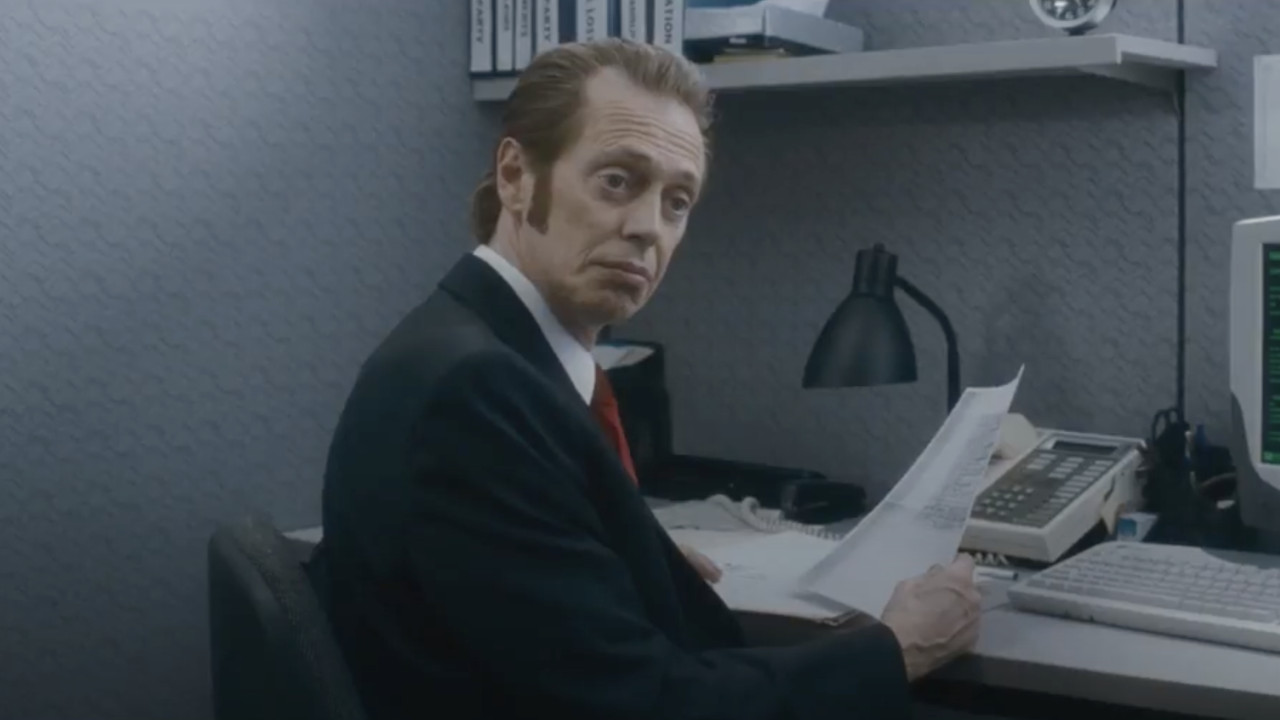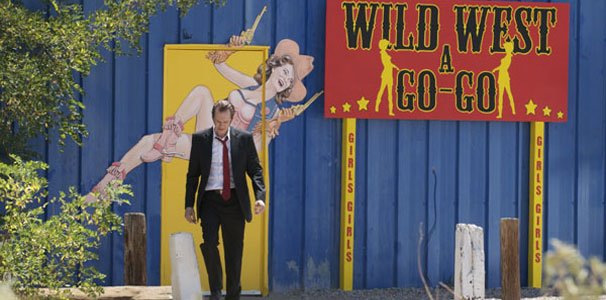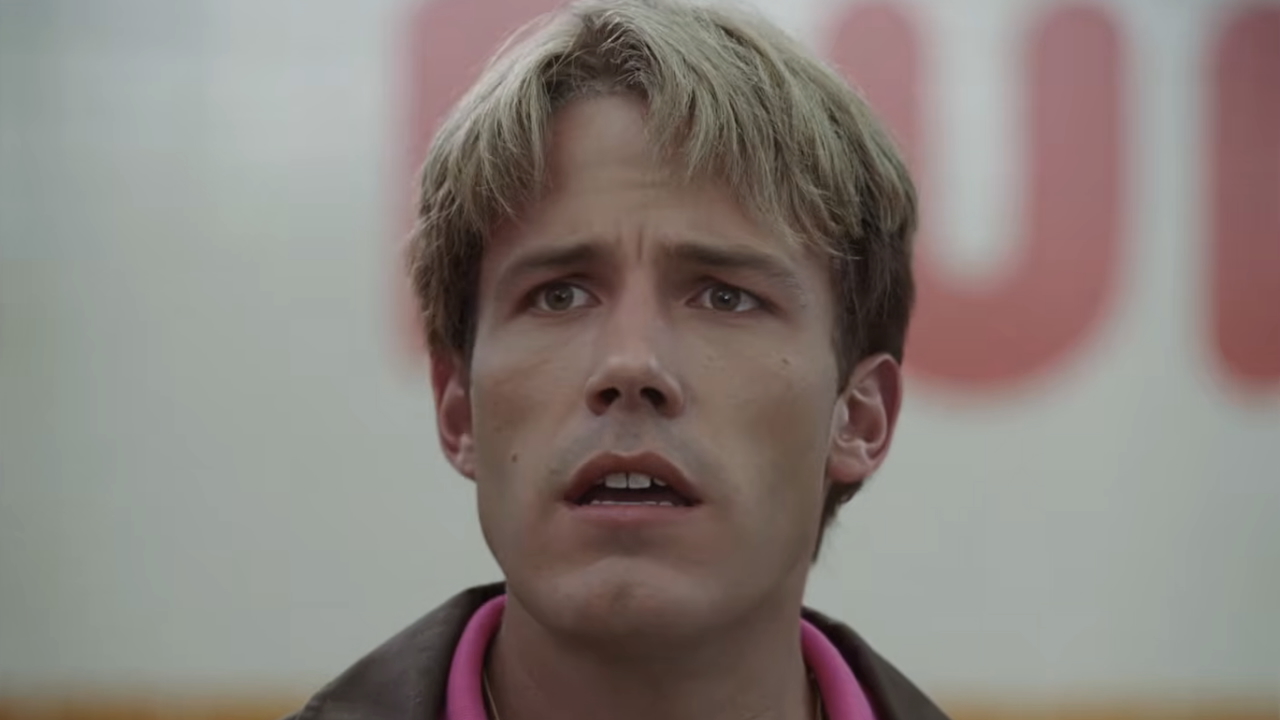Interview: Saint John Of Las Vegas Director Hue Rhodes

Your Daily Blend of Entertainment News
You are now subscribed
Your newsletter sign-up was successful
Hue Rhodes is every professor’s dream. He may have arrived at NYU to study film rather late compared to his peers, but his drive to succeed and passion for the art made him a model student. During a roundtable interview, the first time writer/director gushed about all he learned at school and how it made him the filmmaker he is today.
His mentors should be proud because his feature debut, Saint John of Las Vegas, makes its way into theaters in New York and Los Angeles on January 29th with a wider release planned for February 12th. What’s even more impressive is the brilliant minds he attracted to join the project. Not only does the film star Steve Buscemi, Romany Malco, Sarah Silverman, Peter Dinklage, Tim Blake Nelson, John Cho and Emmanuelle Chriqui, but it’s executive produced by Buscemi, Wren Arthur, Stanley Tucci and Spike Lee.
The film boasts a unique charm, just like its creator. Saint John is Rhodes’ first feature film, but it certainly won’t be his last. Check out what Rhodes says about his journey to the director’s chair and lessons he’s learned for the future.
As a first time writer/director, what was the thing that surprised you the most about filmmaking?
The whole experience is pretty surprising. The first day of production there’s tents and trucks! Huge tents for food and it looks like, it actually looked bigger than the Law & Order shoots in the city because here in New York they spread the trailers out just for traffic, but in New Mexico we took over a huge Target parking lot. That first day the kind of enormity of all of these people running around I think was the most surprising.
You’ve been very busy in other industries before getting into filmmaking. How’d the transition come about?
I had no art background. I went to undergrad and grad school for engineering and I worked in software for six years. I was the manager for online music and DVDs for bluelight.com, which was Kmart online and I got invited to a big conference where the retailers make the advanced buys on the DVDs. So several years ago, let’s say, Wal-Mart committed to buying five million copies of Avatar before it had finished and the studios would use that advanced buys leverage to finance the movie. I had no idea that this happened, but watching this sale happen it got demystified a little bit, just enough I could sort of see how a movie might get made. I didn’t know what any of the people did at the end of the credits. I like to say, you can eat your whole life and not know how to cook. But seeing that money flow, just enough, it was like a little crack, I go, ‘Maybe I could do that.’ But I didn’t even know what that was.
Your Daily Blend of Entertainment News
I took a bunch of community college classes at San Francisco on anything that was under their film category just to see what the different jobs were and I loved all of them. I made a couple of short films and they were not particularly good. [Laughs] I shot a documentary, I sent it to NYU and they liked it. Not because you would like it but I think because I made some, what they thought were smart decisions. The documentary was 20 minutes long and I put the tragic stuff at minute 13 or 14 and when I as interviewing with NYU they said, ‘You know, that’s not the intuitive thing to do. Most people, if they try to break your heart, they try to break it upfront.’ To know that the heartbreak will only come if you give 13 minutes of time and then heartbreak, they appreciated that and they liked that and that was enough for them. And once I started film school that was my new vocation. I was a little older when I went. I was 31 when I started and I just treated it like a professional school. I was definitely all in and I threw myself in and I threw my wife.

You’ve got an impressive group of people backing you up on this project. How’d they get involved.
I met Spike [Lee] at NYU. He had offered to help as a faculty member. He’d help people with their short films and I met with him and I said, ‘I’ve got a feature script. Will you read it?’ and he said, ‘No.’ But he said, ‘Do you have a summary? I’ll read that.’ So I made an appointment two weeks later and I came back and he goes, ‘This is good. Is the script this good?’ And I said, ‘Yeah it is.’ He goes, ‘Gimmie the script.’ So then I had it in the bag because I’d read that Spike expects you to like, ‘Why aren’t you carrying you’re movies, why aren’t you carrying your scripts?’ He is so hustle oriented. He was glad that I had it and then he read it and two weeks later he talked to me about it and he was so insightful.
The part that was not in the movie when he read it was the part in the minimart where he’s all beat up. And [Spike] said, ‘Look, you’ve basically got a gambling addict who gets assigned to Vegas. That is not enough to make dramatic tension because you could gamble yourself to death online.’ He said, ‘I need to know the kind of things that happen to John in Vegas.’ He did have the 1,000 bucks in the car and I thought – I love Vegas. Love it, love it – but I think that if you were weak enough to take 1,000 bucks and go to the strip and blow it all on the roll of the dice and if Vegas smelled that in you, it would take your money in a minimart. That’s what happens in Vegas, loss of dignity and control. In John’s mind, when he had that money he was headed to the strip, he was picking up the girl who worked there and he was just going to go out in a blaze of glory, but he gets his dignity taken and that’s the pain, that’s the reason that he has to stay away. Not because he has a gambling problem, but for loss of dignity. That’s when the script really came alive, when I got to write that last scene and then [Spike] agreed to also be an executive producer, which he vouched for me and that meant a lot. At first it was just NYU film student, hey I’ve got a script and then Spike agreed to be executive producer, a lot of people would give it a second look.
How’d Steve get the script?
We had been hustling other people and trying to exploit ever connect we had. I had given the script to somebody who gave it to a friend who gave it to a friend who gave it to Steve’s agent who gave it to Steve. So we found out that he had it kind of indirectly while we were busy begging and pleading somewhere else. And he read it and he liked it. We had a great talk. I think Steve and I resonated and he liked my shorts films. And then that’s where Stanley [Tucci] came in because Steve and Stanley and Wren Arthur had started a production company called Olive and they said, ‘Not only does Steve want to be in this movie, but we’d like to make this our first production.’ I’ve heard that sometimes celebrities will take a producer credit to be in that end of it, but they were extremely active. They were active in pre-production, they were active in casting, production design. I definitely owe a lot to Steve and Olive Productions.
What’d you learn while making this film that you’ll consider for your next?
It’s hard to point to a specific, but certainly as I’m writing now I have a clearer sense of how this might end up in the end. I’d made some short films but a feature is just different in terms of its scope. The thing that I’m very happy about what we did was I think we took the constraints that we were given, that any independent film is given, and our mantra on set was let’s pretend like we wanted it this way. For example, we didn’t have a lot of shooting time. So we decided always to shoot square to the plain, make all the singles clean. There are no dirty over-the-shoulders in the movie. There are no faces. Everything is clean, square. So we set up this structure for shooting, always square to the plain, always clean. It makes it feel wonderfully designed, but it also became a great shorthand. Once things get geometric that way, you can skip a lot of other steps. I think that kind of decision and that kind of spirit would be extremely important to take on because there will always constraints and limitations.
Staff Writer for CinemaBlend.

